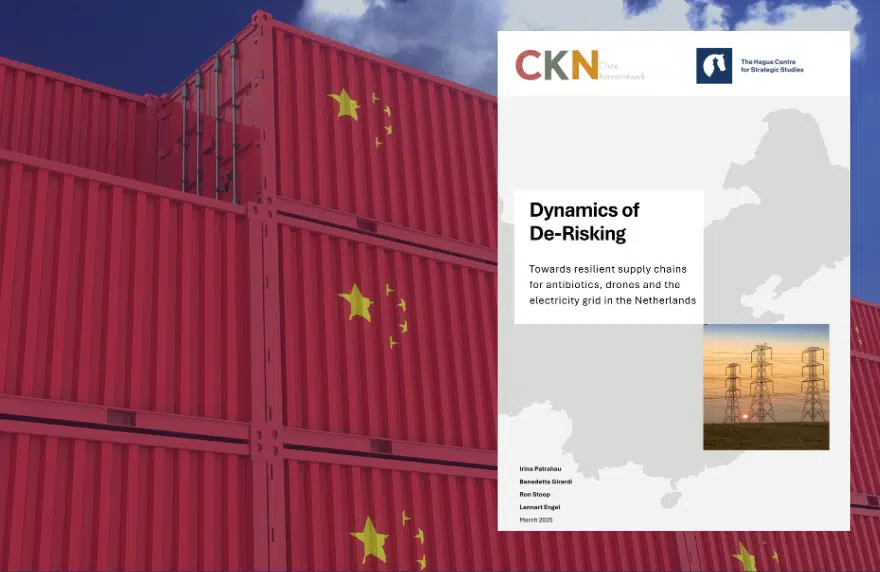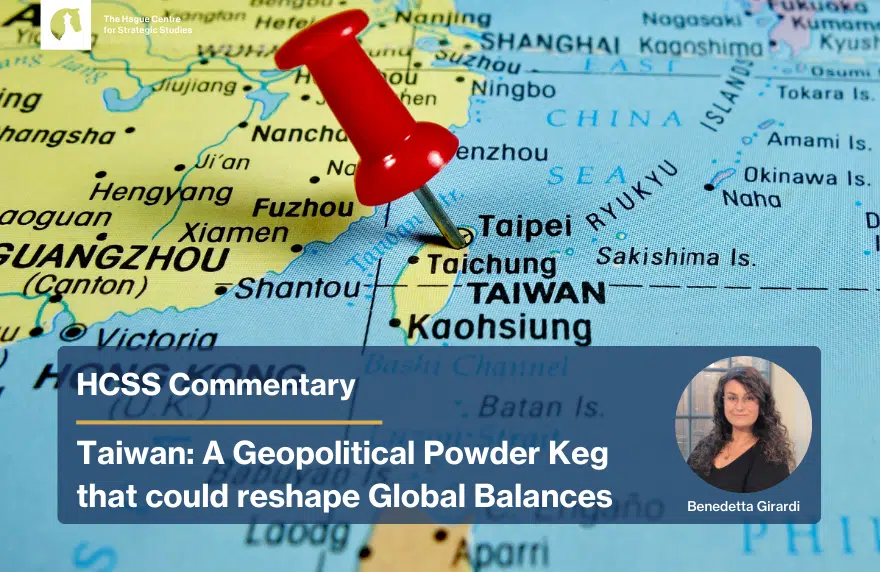The European Union and its member states face growing vulnerabilities due to economic dependencies on China, particularly in health, defence, and energy. As China increasingly employs economic statecraft tactics—using economic tools to exert geopolitical influence—the EU must find ways to safeguard its vital sectors.
To address these risks, the EU has launched a ‘de-risking’ agenda, aimed at reducing critical dependencies while maintaining an open global economy. However, efforts so far have been fragmented, lacking a cross-sectoral strategy that accounts for interconnected risks and synergies.
This new HCSS report, developed as a part of the China Knowledge Network (CKN), examines Europe’s approach to de-risking, with a focus on three Dutch vital sectors.
The report:
✅ Creates a taxonomy of EU de-risking measures
✅ Assesses China’s potential responses
✅ Identifies vulnerabilities in the supply chains of Dutch antibiotics, drones, and electricity grid components
✅ Evaluates de-risking interventions for the Netherlands and Europe
Key Findings:
- Antibiotics: Europe relies heavily on China for generic antibiotics, especially in upstream supply chains. While EU pharmaceutical reform is underway, national-level action is needed to secure supply chains. The main challenge is balancing affordability with resilience—how much are the Netherlands and Europe willing to invest in a sovereign pharmaceutical industry?
- Drones: Both military and civilian UAV supply chains are deeply intertwined with China. While military drones are largely sourced from Western countries, they still depend on Chinese components. Civilian drones, on the other hand, are predominantly imported from China. To enhance resilience, the Netherlands and Europe must invest in supply chain mapping, supplier diversification, and domestic production capacity.
- Electricity Grid: Grid components have relatively diversified supply chains, partly based in Europe, though dependencies on Chinese materials remain. While most of these dependencies are not sector specific, materials like grain-oriented electrical steel (GOES) remain important to secure in light of the growing demand. Operators in the Netherlands have taken steps to mitigate risks, though procurement reforms, R&D investment, and standardization are also recommended reduce dependence on Chinese suppliers.
Apart from evaluating sector-specific interventions, this report also draws three overarching conclusions:
- Set Clear De-Risking Goals: Policymakers must define sector-specific targets at the EU level to ensure a focused and effective approach.
- Adopt a Cross-Sectoral Strategy: De-risking efforts must be coordinated to avoid unintended consequences and mitigate potential retaliation from China.
- Prepare for Retaliation: Given China’s history of using economic statecraft, Europe must develop proactive risk mitigation strategies.
With geopolitical tensions rising, the EU and the Netherlands must act swiftly to strengthen supply chain security. A comprehensive de-risking strategy—backed by domestic investments, public-private partnerships, and coordinated policymaking—will be key to safeguarding Europe’s economic and strategic autonomy.
Authors: Irina Patrahau, Benedetta Girardi, Ron Stoop and Lennart Engel.
This report was published under the framework agreement for the China Knowledge Network (CKN), funded by the Dutch Ministry of Foreign Affairs, for knowledge exchange with all Dutch ministries regarding policy challenges and opportunities related to China. The responsibility for the content and expressed opinions lies solely with the authors. The network is jointly managed by the Dutch Ministry of Foreign Affairs, the Netherlands Institute of International Relations ‘Clingendael,’ and the LeidenAsiaCentre.
This paper was developed with the valuable support of various contributors. The authors wish to acknowledge the contributions from Tim Sweijs, Ana Dadu, Ciaran Cassidy from HCSS, Joris Teer, who worked at the HCSS until April 2024, as well as Hongcheng Hsiao, PhD candidate at the Centre for Security, Diplomacy, and Strategy (CSDS) at the Vrije Universiteit Brussel (VUB) in Belgium. Special thanks go to Ingrid d’Hooghe, senior research associate at the Clingendael Institute, and to Paul Sinning of HCSS, for their guidance and peer review.
The medical, energy and defence sectors are of vital national security importance for the Netherlands and the EU; but they’re also sectors in which we have an asymmetric dependency with China, HCSS expert Irina Patrahau warns in this explainer video for her latest report, “Dynamics Of De-Risking”.









